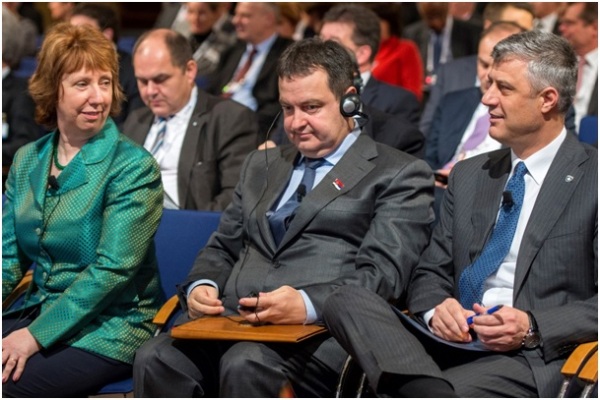The Progressive Alliance of Socialists and Democrats, a political group in the European Parliament, officially nominated High Representative Catherine Ashton, Prime Minister of Kosovo Hashim Thaçi and Serbian Prime Minister Ivaca Dačić for the Nobel Peace Prize. However, the two latter nominees have a murky past, which puts their nomination into question.

50th Munich Security Conference 2014: Catherine Ashton, Ivica Dačić and Hashim Thaçi: Ivica Dačić (Prime Minister, Belgrade), Hashim Thaçi (Prime Minister, Pristina) and Catherine Ashton (High Representative for Foreign Affairs and Security Policy, EU).
Credits: http://www.securityconference.de
This is the second nomination of the three candidates, representatives of the Serbian and Albanian lobbying group in the US congress having voiced the same nomination one month prior. The nomination is based on the historic EU-mediated agreement between Belgrade and Pristina that took place in Brussels on 19 April 2013. The agreement marks a milestone in the relations between Kosovo and Serbia, establishing among other issues the free flow of people and goods and the representation of Kosovo at regional conferences. Furthermore, the agreement establishes the dissolution of Serbian institutions currently present in Kosovo and envisages the creation of an Association of Serb Municipalities in Kosovo. This allows for a more de facto independent Kosovo at the same time as it assures a certain autonomy for the Serb minority present in Northern Kosovo. The Socialists and Democrats thus argue in their nomination letter that “ »The efforts to normalise relations between the two countries have been unprecedented and have created the opportunity of lasting peace and cooperation in the region. » However, the nomination has induced much controversy, particularly in the Balkan region.
Two nominees, two faces of a joint history
The recent past of the two Prime Ministers in the Balkan region is nothing if not controversial. In fact, they both had prominent roles in the wars following the break-up of the former Yugoslavia. Prime Minister Dačić was the right hand and spokesperson of former leader Slobodan Milosevic, trialed afterward by the ICTY. Concerning Prime Minister Thaçi, he was at the head of the political wing of the Kosovo Liberation Army. A special task force of the European Union is currently investigating an allegation of organ-trafficking during the Kosovo war when Thaçi was one of the heads of the guerilla. His rivals accuse him of having ordered arrests, assassinations and purges during the war; however, the Prime Minister strongly denies these accusations. Nevertheless, in the nomination letter of the European Socialists and Democrats, the past of the two Prime Ministers is not seen as a hinder to their nomination, but rather as a further reason as to why they should now be awarded the Nobel Peace Prize. The letter states that “Their leadership was all the more remarkable given the prominent role each played on opposing sides in the conflict during the 1990s”.
Strong reactions to the controversial nomination
Thus, the reactions following the nomination have been strong. In Serbia, Thaçi is deeply despised. “Most people in Serbia consider Thaçi to be an unindicted war criminal who personifies the double standard of the victor’s justice”, stated Ljiljana Smajlovic to the New York Times, president of the Serbian Journalists’ Association and a prominent Serbian commentator. This view is confirmed by the reaction of Serbian President Tomislav Nikolić, who openly disapproves of the nomination, voicing fears that investigations of the alleged war crimes of the former commander could be brought to an end if he won the prize. Dačić is an equally disdained figure in countries outside of Serbia, where he has been nicknamed “Little Sloba” for his strong ties to Milosevic. There are even debates within the European Socialists and Democrats party, who initiated the nomination. The Czech MEP Richard Falbr is an example; he fears that the controversial nomination will cast a shadow over the party as a whole, and worries that it might affect the European elections in May.
It seems that the nomination has excited more indignation than gratification, thus diverging from what one can only assume was its original intention. The fact is that the Balkans remain deeply traumatized by the terrible events of its past. For many, the potential Peace Prize given to two important players of the war would epitomize that one should forgive and forget – something the majority of the population is unwilling to do.
Maria Hviding
